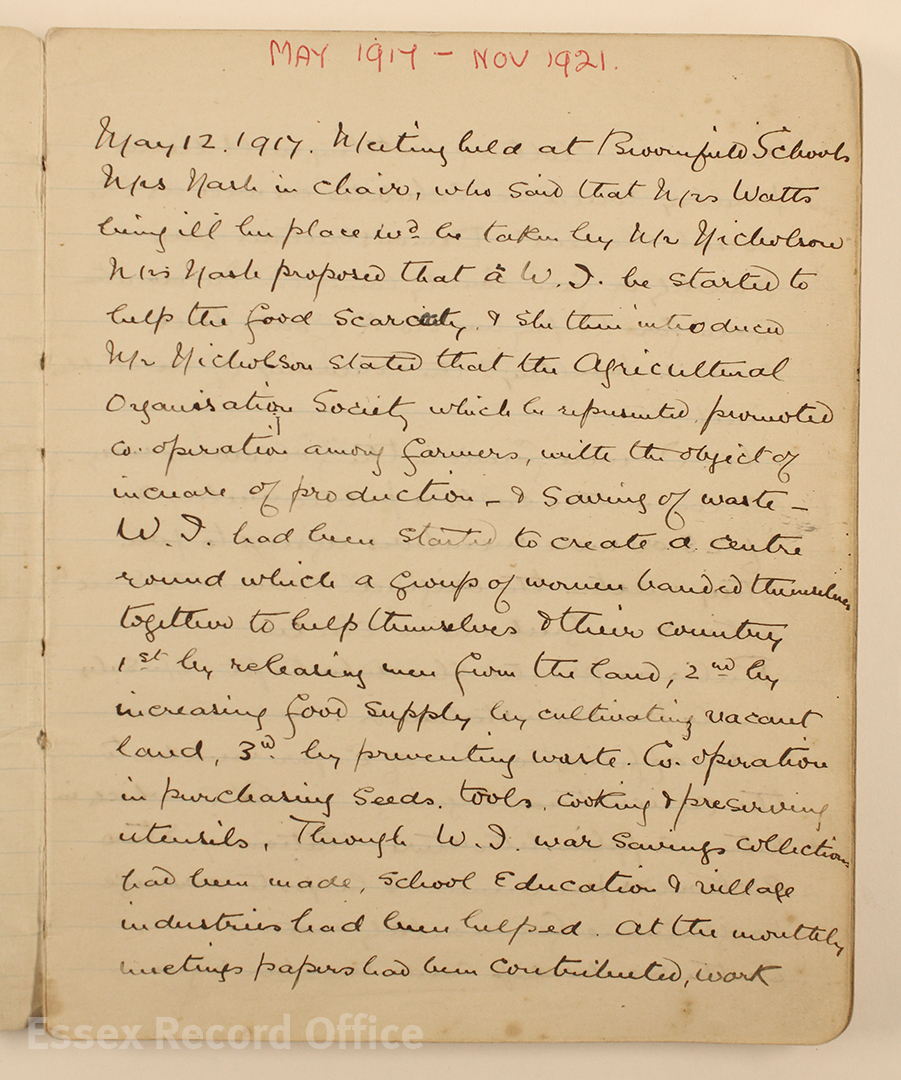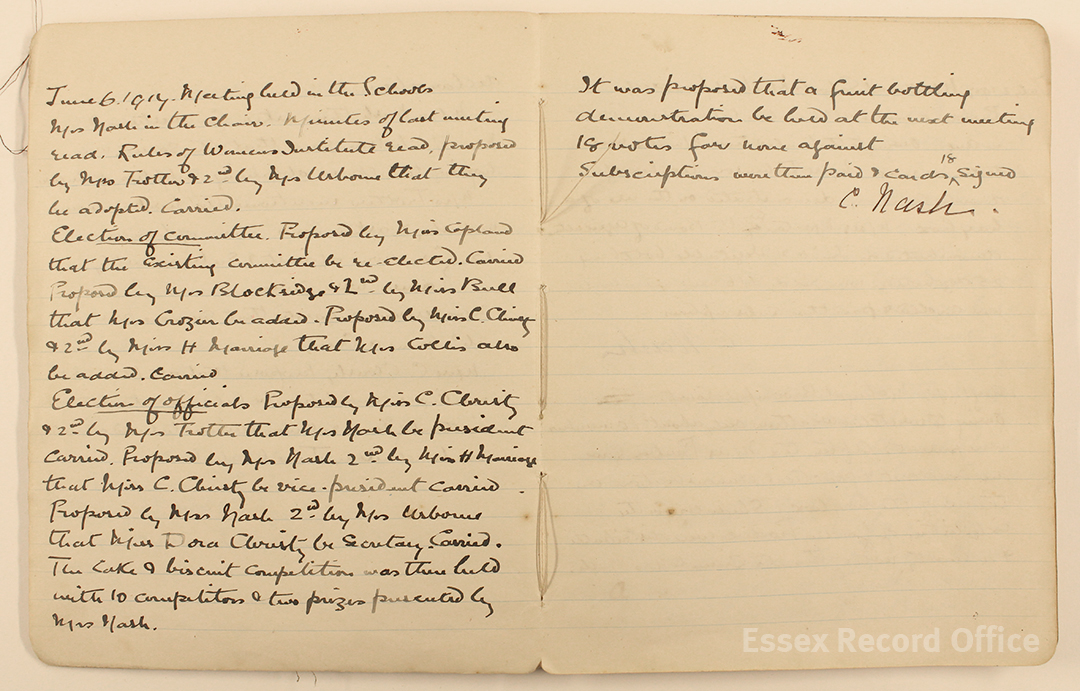Our Document of the Month for March 2017 has been chosen by Archivist Katharine Schofield, who has selected the earliest record of the Women’s Institute in Essex, the minutes of the Broomfield WI who began meeting in May 1917.
The Women’s Institute can trace its origins back to Ontario, Canada in 1897. In Britain the WI was created in part to cope with food shortages during the First World War and to help rural communities generally. The first British meeting was held in Anglesey in 1915.
In Essex there were twenty-two WIs in existence by the end of 1917, with minutes surviving for the County Federation of Essex Women’s Institutes (Accession A8980 Box 1) and for the WIs at Broomfield (Accession A11304 Box 1), Epping (Accession A13888 Box 1) and Woodham Ferrers (Accession A11292 Box 39). The earliest record of a meeting was at Broomfield on 12 May 1917, followed by Woodham Ferrers on 6 June and Epping on 13 September.

Minutes from the first meeting of the Broomfield WI on 12 May 1917 – the earliest WI meeting in Essex for which we have any records
The WI was promoted by Mrs Alfred Watt, one of Canada’s first female university graduates. Madge Watt had been widowed and in 1913 came to Britain with the intention at least in part to establish the WI here. The First World War and the need for increased food production gave her the opportunity, working in partnership with the Agricultural Organisation Society (AOS).
Mrs Watt and a representative from the Society toured the county addressing prospective groups. In April 1917 Mrs Watt spoke to a group of women at Chelmsford and presumably this inspired smaller groups to invite her to speak in their villages. She was too ill to attend the first meeting of the Broomfield WI so Mr Nicholson from the AOS spoke instead.
It was proposed that a WI be started ‘to help food scarcity’, and Mr Nicholson described the WI as ‘a centre round which a group of women banded themselves together to help themselves and their country’. They would be able to do this ‘1st by releasing men from the land, 2nd by increasing food supply by cultivating vacant land, 3rd by preventing waste’. There would be co-operation in buying seeds, tools, cooking and preserving utensils. The WI also made war savings collections and helped village schools and industries. The meetings themselves offered women the opportunity to work on home-made clothing, see demonstrations and hear about keeping livestock, goats, bees, rabbits and poultry and conserving fruit and vegetables, as well as an opportunity to enjoy ‘the social element’.
In Woodham Ferrers the rector had arranged the meeting and spoke about the ‘beneficial advantages’ before introducing Mrs Watt. By the time that the Epping WI was started the County Federation had been established and the speakers were Lady Petre and Mrs Watt.
Most of these initial meetings were then given over to the practicalities of setting the group up and electing officers for future meetings. By 1917 there was an established national organisation to provide guidance, suggestions for talks and demonstrations, as well as supply badges and other items. Both Woodham Ferrers and Epping WIs purchased a book for their minutes stamped on the front ‘Agricultural Organisation Society’ at a cost of 6s.
The first organised meeting of the Broomfield WI was held on 6 June. The minutes record that the first competition, making cakes or biscuits without flour, had ten entries with two prizes awarded and the first talk, arranged for the next meeting, was to be a demonstration of fruit bottling. The Epping WI talks for 1917 were on the subjects of ‘parcels for the Front’, sugar substitutes and the care of children in winter. The first competition in Epping was the best home-made Christmas gift, cost not to exceed 6d. At Epping there was some discussion about the membership fees ‘amongst the poorer people’ with a suggestion that these might be paid at a rate of 2d. per month. It was also agreed ‘by large majority’ that members could bring their children to meetings and that a volunteer would look after them in a separate room.

Minutes from the second meeting of the Broomfield WI on 6 June 1917. A competition was held for baking cakes and biscuits without flour, and a demonstration of fruit bottling was organised for the next meeting.
The singing of Jerusalem was not associated with the WI until the early 1920s, but the first meeting at Woodham Ferrers concluded with the singing of the National Anthem.
In September the County Federation met for the first time at the Shire Hall in Chelmsford, with Lady Petre subsequently serving as the first president. The County Federation minutes record an organisation which grew rapidly from 1917. By the end of 1918 the number of groups in Essex had more than doubled. There had been classes on basket and glove making, boot mending, cobbling, rush work and straw plaiting, as well as lectures on housecraft, including mending leaks and repairing taps.
Although the WI was established with the aim of helping the war effort during the First World War, the organisation was keen that they should continue after the war. In December 1918, only a month after the Armistice, the County Federation’s half-yearly report reiterated that while the production of food was of primary importance, ‘due weight’ should be given to the subject of Housecraft and the promotion of local handicrafts or industries. The WI should ‘arouse interest in local history’ as well as teach the ‘principles and duties of citizenship’. It should be a ‘valuable means to promote businesslike methods among women of all classes.’
The minutes of the first meeting of the Broomfield WI will be on display in the ERO Searchroom throughout March 2017.

Thank you for sharing this. It is very interesting to me as a WI MEMBER of more than 35 years.